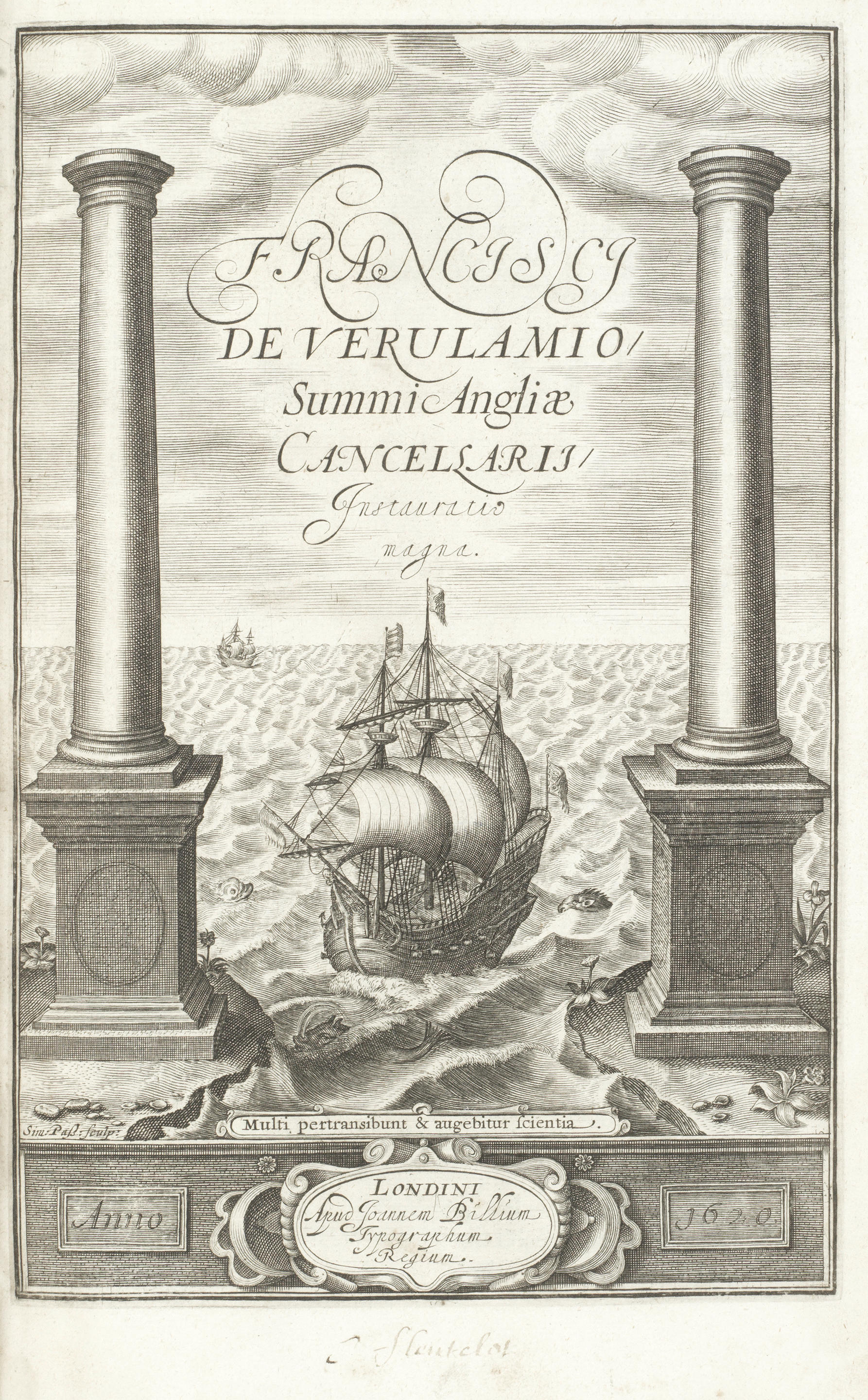BACON, Francis (1561-1626). Instauratio magna [ Novum organum ]. London: John Bill 1620. 2 o (290 x 190 mm). Engraved title by Simon van de Passe, woodcut head-pieces and historiated initials. Seventeenth-century vellum (some soiling, remains of old blue paper wrapper on pastedowns). Provenance : two faint early inscriptions on title; Frederick Spiegelberg (bookplate). FIRST EDITION of Bacon's manifesto for a new philosophy of scientific method, relying on laws deduced from observation and investigation. Second issue, with e3 cancelled and reprinted on e4r, adding an errata and omitting the name of Bill Norton from the colophon. Bacon originally conceived his revolutionary work in six parts, of which only the first and second parts, the De augmentiis scientiarum (1623, a greatly expanded version of the Advancement of learning ) and the Novum organum were completed. More than a mere portion of the Instauratio , however, the Novum organum , as its title implies, "contains the central ideas of Bacon's system, of which the whole of the Instauratio is only the development" (Pforzheimer, p. XXI). Bacon's aim was to lay an entirely new foundation for science, "neither leaping to unproved general principles in the manner of the ancient philosophers nor heaping up unrelated facts in the manner of the 'empirics'" (DSB). He conceived a new method of acquiring knowledge of the world through observation, experiment and inductive reasoning, which he envisioned as a tool for the "'total reconstruction of sciences, arts and all human knowledge... to extend the power and dominion of the human race... over the universe'... Bacon made no contributions to science itself, but his insistence on making science experimental and factual, rather than speculative and philosophical, had powerful consequences.... As a philosopher Bacon's influence on Locke and through him on subsequent English schools of psychology and ethics was profound. Leibniz, Huygens and particularly Robert Boyle were deeply indebted to him, as were the Encyclopidistes and Voltaire..." (PMM). His vision inspired the creation of the Royal Society and the other early scientific academies. Gibson 103b; Dibner Heralds of Science 80; Grolier/Horblit 8b; Norman 98 (large-paper copy); Pforzheimer App. 1; PMM 119; STC 1163. A FINE COPY.
BACON, Francis (1561-1626). Instauratio magna [ Novum organum ]. London: John Bill 1620. 2 o (290 x 190 mm). Engraved title by Simon van de Passe, woodcut head-pieces and historiated initials. Seventeenth-century vellum (some soiling, remains of old blue paper wrapper on pastedowns). Provenance : two faint early inscriptions on title; Frederick Spiegelberg (bookplate). FIRST EDITION of Bacon's manifesto for a new philosophy of scientific method, relying on laws deduced from observation and investigation. Second issue, with e3 cancelled and reprinted on e4r, adding an errata and omitting the name of Bill Norton from the colophon. Bacon originally conceived his revolutionary work in six parts, of which only the first and second parts, the De augmentiis scientiarum (1623, a greatly expanded version of the Advancement of learning ) and the Novum organum were completed. More than a mere portion of the Instauratio , however, the Novum organum , as its title implies, "contains the central ideas of Bacon's system, of which the whole of the Instauratio is only the development" (Pforzheimer, p. XXI). Bacon's aim was to lay an entirely new foundation for science, "neither leaping to unproved general principles in the manner of the ancient philosophers nor heaping up unrelated facts in the manner of the 'empirics'" (DSB). He conceived a new method of acquiring knowledge of the world through observation, experiment and inductive reasoning, which he envisioned as a tool for the "'total reconstruction of sciences, arts and all human knowledge... to extend the power and dominion of the human race... over the universe'... Bacon made no contributions to science itself, but his insistence on making science experimental and factual, rather than speculative and philosophical, had powerful consequences.... As a philosopher Bacon's influence on Locke and through him on subsequent English schools of psychology and ethics was profound. Leibniz, Huygens and particularly Robert Boyle were deeply indebted to him, as were the Encyclopidistes and Voltaire..." (PMM). His vision inspired the creation of the Royal Society and the other early scientific academies. Gibson 103b; Dibner Heralds of Science 80; Grolier/Horblit 8b; Norman 98 (large-paper copy); Pforzheimer App. 1; PMM 119; STC 1163. A FINE COPY.


.jpg)












Try LotSearch and its premium features for 7 days - without any costs!
Be notified automatically about new items in upcoming auctions.
Create an alert